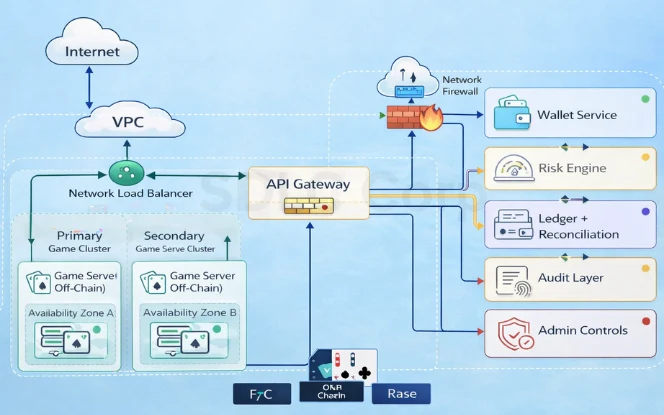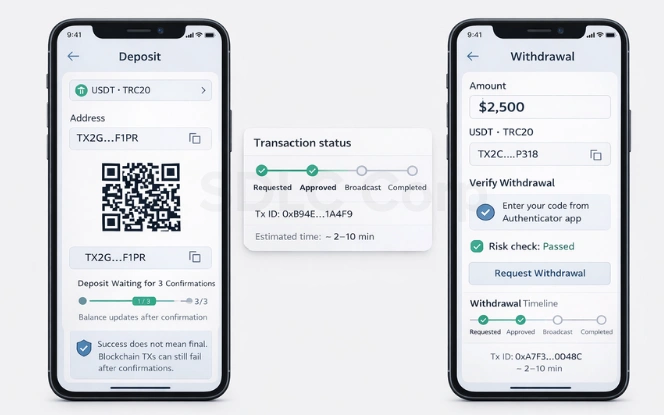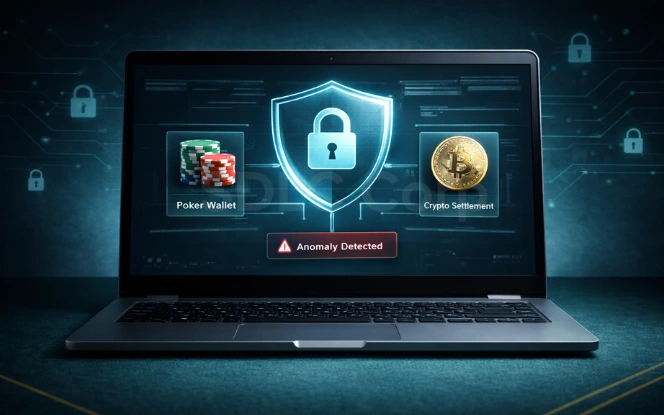Blockchain in Poker Game depends on trust around fairness, balances, and payouts. Therefore, players must believe cards are dealt fairly, records stay accurate, and withdrawals happen without hidden edits, while operators defend against fraud, chargebacks, and “rigged game” claims. Because of that pressure, teams consider blockchain to improve settlement transparency and verification; however, it does not make poker fair by itself. Instead, it works best as a settlement and audit layer that helps prove money movement and critical records, reducing disputes with evidence.
Where Blockchain Fits in a Poker Platform
Poker platforms work best when gameplay stays fast, while settlement and records stay verifiable. Therefore, this section shows the practical off-chain vs on-chain split teams use in production.
Off-Chain Gameplay in Blockchain Poker
Poker is real-time. Therefore, every action fold, call, raise, and timer expiry must be processed in milliseconds. If you push these actions to a public chain, problems show up quickly:
- Confirmation delays slow the table
- Fees make frequent actions expensive
- Congestion makes performance unpredictable
- Public execution can increase timing and visibility risks
Therefore, production poker platforms keep the game engine off-chain. The game server handles table state, betting rules, dealing, and timing. It also runs anti-bot and anti-collusion checks that need fast decisions topics covered in our poker game development services.
On-Chain Settlement and Integrity Anchors
In practice, blockchain helps most where you need verifiable settlement and tamper-evident records:
- Deposits and withdrawals (status, timestamps, settlement proof)
- Tournament prize distribution (proof of payouts and amounts)
- Integrity checkpoints (hash “fingerprints” of ledgers or reports to show they were not edited later)
So, this split keeps gameplay fast while improving auditability for the parts players argue about most: money, outcomes, and records.
Benefits of Blockchain in Poker Game
These benefits matter when blockchain is used for settlement visibility and record integrity, not for real-time gameplay. This section lists the outcomes teams usually aim for.
- More transparent settlement using transaction IDs and clear payout states
- Stronger dispute handling with tamper-evident report fingerprints
- Cleaner reconciliation between on-chain settlement and internal wallet entries
- Better audit readiness when anchors are paired with internal logs and approvals
These benefits are the most common reasons teams adopt Blockchain in Poker Game for settlement visibility and record integrity.
Architecture Overview
This section outlines the key services and how they connect on a poker platform that keeps gameplay fast and makes settlements verifiable.

- Game Server (Off-Chain): table state, dealing, betting rules, timers, anti-collusion checks
- API Gateway: request validation, rate limits, auth enforcement, routing
- Wallet Service: balances, limits, approvals, retry-safe payouts (retries won’t pay twice)
- Risk Engine: withdrawal scoring (device, location, velocity, anomaly signals)
- Ledger + Reconciliation: internal accounting entries + matching against on-chain settlement
- Audit Layer: anchored fingerprints of ledger snapshots and payout reports
- Admin Controls: separate review/approve roles + immutable admin logs
Implementation Steps for Blockchain Poker
This section gives a practical implementation path and a simple architecture split. Therefore, it focuses on what teams build first to reduce payout and record disputes. For Blockchain in Poker Game, the priority is fast gameplay and verifiable settlement.
Step 1: Define Scope and Non-Goals
- Keep table state, dealing, betting, and timers off-chain
- Use blockchain for deposits, withdrawals, payout proof, and integrity checkpoints
- Write non-goals clearly (for example: “blockchain stops collusion” or “payouts are instant”)
Step 2: Choose Settlement Rails and Confirmation Policy
- Select the chains/tokens you will support
- Set confirmation or practical finality thresholds for deposit crediting
- Define how congestion and low-fee delays appear in payout status states
Step 3: Build Wallet and Payout State Management
- Use a ledger model to represent credits, debits, fees, and reversals
- Keep processing retry-safe, so repeated requests do not double-pay
- Store payout states like: requested → approved → broadcast → confirmed
Step 4: Add Custody, Risk, and Monitoring
- Separate hot, warm, and cold exposure based on risk policy
- Constrain signing with approvals, limits, and environment separation
- Score withdrawals using device, location, velocity, and anomaly signals
- Ship monitoring and playbooks for stuck transactions, wrong-address cases, and key compromise drills
Use Cases
These are the most common places where blockchain can reduce disputes or improve verification. Each use case maps to either settlement tracking or tamper-evident reporting.
Deposits With Rules-Based Crediting: credit only after confirmation/finality thresholds, and therefore show “pending” clearly.
- Withdrawals With Verifiable Tracking: provide transaction IDs and clear payout states with approval discipline
- Tournament Prize Distribution Proof: anchor payout tables so disputes can be handled with evidence
- Dispute Resolution With Integrity Anchors: prove a record was included in an anchored report without exposing other users’ data
- Fairness Transparency: publish commitment and reveal data for post-hand verification
- Controlled Smart Contract Scope: use contracts for narrow flows such as escrowed prize pools or deterministic payout distribution
- Rewards and Loyalty: Use reward tokens only when earn-and-redeem rules are clear and abuse-resistant
Blockchain for Deposits and Withdrawals
Deposits and withdrawals are the fastest way to gain or lose player trust. This section explains how teams keep accounting consistent and payouts explainable. In Blockchain in Poker Game, clear status states and rules-based crediting reduce payout disputes.

Deposit Flow and Balance Crediting
In poker, a deposit is an accounting event, not a UI state. You must keep the payment rail, wallet ledger, and player balance consistent. With blockchain rails, deposits usually follow a strict pattern:
- The player sends funds to a deposit address
- The system detects the on-chain transaction
- The system waits for confirmations (to reduce reversal risk)
- The wallet service credits the user’s balance
- Reconciliation verifies that the credited amount matches on-chain reality
The key point is simple: crediting must be rules-based. If you credit too early, you can absorb losses when a transaction fails or gets delayed.
Withdrawal Flow and Settlement Tracking
Withdrawals are where trust breaks quickly. Because settlement events are visible and timestamped, blockchain can improve tracking. However, on-chain visibility does not replace internal controls or approval discipline.
Strong withdrawal handling usually includes:
- Risk checks (device, location, velocity, anomaly signals)
- Step-up verification for higher-risk payouts (MFA or re-authentication)
- Approval rules and limits (per day, per account, per device)
- Retry-safe processing (one request cannot pay twice)
- Signing policy controls (who/what can approve transactions)
Many platforms also separate wallets by risk level:
- Hot Wallet: small payouts, strict limits, fast execution
- Warm Wallet: larger buffer, tighter access, slower usage
- Cold Wallet: reserves, strongest controls, rarely used
Finality, Confirmations, and Payout Timing
Many teams market “instant payouts,” yet confirmations, finality, and fee markets still apply. Networks can congest, and fees can spike. Therefore, payout UX needs honest, traceable states:
- requested → approved → broadcast → confirmed
- A transaction ID for user-side tracking
- Clear timing expectations per rail
If you sell “instant” and reality disagrees, trust drops faster because users can see the transaction, but cannot influence confirmation speed.
Audit Trails and Dispute Handling
Most disputes come down to “your records are wrong.” Therefore, this section shows how anchored fingerprints support audits and disputes without exposing private data.
Integrity Logs Using Anchored Fingerprints
Most teams keep full records off-chain, then anchor a hash fingerprint of:
- Daily wallet ledger summaries
- Tournament payout report rows
- Settlement batch summaries
Later, during a dispute, you can show proof that a specific entry was included in that anchored report without publishing everyone’s data.
Verifiable Tournament Payout Records
Tournament settlement creates disputes because it involves many players, prize pools, and timing. Anchoring payout reports provides:
- A consistent record of payout amounts and timestamps
- Evidence that the payout table was not edited later
- Stronger internal support for dispute handling
However, blockchain does not fix poor accounting. It makes good accounting easier to prove.
Blockchain and Poker Fairness
Fairness claims need more than a ledger. This section explains what blockchain can support and what it cannot guarantee on its own.
What Blockchain Can Verify
For fairness claims, blockchain helps only when you anchor proof trails. For example, a platform can record:
- A commitment to randomness before the hand
- A reveal after the hand
- A check that the reveal matches the earlier commitment
This supports “verify later” checks and can reduce manipulation disputes.
What Blockchain Cannot Guarantee Alone?
A ledger does not automatically make shuffles fair. Poker fairness still depends on the randomness quality and the shuffle/deal method. If the server can choose randomness after seeing actions, it can still cheat even if it writes outcomes to a chain.
Practical Proof Patterns
- Commit–Reveal: commit first, reveal later, verify the match
- Proof-Based Randomness: randomness includes a proof that it was not faked
- Mixed Seeds: combine server, player, and external inputs so no single party controls the outcome
The goal stays the same: the platform should not be able to change the deck after it learns player behavior.
Smart Contracts in Poker
Smart contracts can help, but only when the scope stays narrow. This section covers where they fit and why teams avoid on-chain gameplay.
Escrow and Automated Payout Logic
Smart contracts can automate money movement with predefined rules. In poker, narrow use cases tend to work best:
- Escrow for tournament prize pools
- Automated payout distribution based on a submitted payout table
- Rake splitting or affiliate rewards when the rules stay explicit
However, contracts should remain narrow. Full on-chain gameplay increases complexity and latency.
Common Smart Contract Risks
- Access control mistakes are exposing payout functions
- Contract bugs locking or draining funds
- Upgrade mechanisms are becoming a governance risk if admin keys are weak
- Irreversible execution limits recovery options
Because poker moves money constantly, contract governance and signing controls matter as much as the contract logic.
Tokenization in Poker
Tokens can simplify chips and rewards, but they can also increase disputes when value or redemption rules are unclear.
In poker products, teams typically use tokens in three ways:
- Chips as tokens
- Loyalty/reward tokens
- Ownership-style assets (cosmetics, badges, tournament tickets)
Tokenization works best when value stays stable, and earn-and-redeem rules stay clear. It becomes risky when chips turn volatile, or redemption remains unclear, because disputes and abuse patterns can increase.
Security in Blockchain Poker Systems
On-chain rails increase custody responsibility, so strong key, admin, and evidence controls matter just like data security in poker apps.

Key Custody and Wallet Security
Blockchain shifts custody risk toward the operator. With on-chain rails, key custody becomes critical infrastructure:
- Separate environments and permissions
- Limited signing authority with enforced approvals
- Withdrawal monitoring with velocity limits
- Reserves kept away from internet-exposed systems
If an attacker gains signing capability, settlement transparency will not save funds. So, custody controls must come first.
Admin Controls and Operational Discipline
Poker platforms expose powerful admin actions: balance adjustments, withdrawal approvals, risk rule changes, and dispute handling. Strong access control and audit trails are mandatory:
- Least-privilege access for wallet and admin functions
- Separate roles for review vs approve
- Immutable admin logs with alerts on sensitive actions
- Break-glass processes for emergencies
Blockchain will not prevent internal misuse unless admin actions are controlled, reviewed, and logged.
Evidence Checklist
A serious platform can produce evidence that reduces disputes:
- Transaction IDs and settlement records for payouts
- Anchored fingerprints of payout reports and ledger snapshots
- Logs for approvals, risk checks, and signing policies
- Alerts and monitoring records for anomalies
Trade-Offs and Limitations
Blockchain improves verification, but it also adds operational cost and new risk. This table summarizes the trade-offs teams should plan for before shipping.
| Trade-Off | What It Means | How Teams Handle It |
|---|---|---|
| Fees and congestion | Cost and timing can change during network spikes | Use clear payout states, plan fallback rails, and set realistic timing expectations |
| Confirmation delays | Settlement is not always immediate | Credit deposits only after thresholds and show “pending → confirmed” clearly |
| Support burden | Wrong-address sends and reversals are hard to recover | Add address checks, user warnings, and a dispute workflow with evidence logs |
| Operational complexity | Reconciliation and incident response require more processes | Run reconciliation jobs, monitoring alerts, and playbooks for stuck transactions |
| New threat surface | Key theft, phishing, wallet compromise, and contract risk | Use strong custody controls, approvals, limits, and continuous monitoring |
Conclusion
Overall, Blockchain in Poker Game works best for settlement transparency, audit trails, and verifiable integrity anchors that reduce payout and balance disputes. However, it does not make poker fair by default and cannot replace core security controls. Therefore, most platforms keep gameplay off-chain for performance and use blockchain for settlement and anchoring while prioritizing key custody, strong admin controls, and fraud monitoring.
FAQ's
Does blockchain make online poker fair by default?
No. Blockchain can add transparency, but fairness still depends on how shuffling and randomness are generated and controlled.
Where does blockchain fit best in a poker game app?
It fits best in settlement and verification deposits, withdrawals, payout proof, and tamper-evident audit checkpoints.
Should poker gameplay run on-chain?
Usually no. Real-time actions need millisecond speed, while public chains add confirmation delays, fees, and congestion risk.
How do anchored fingerprints help with disputes?
Teams hash payout or ledger reports and anchor that fingerprint on-chain, then later prove a specific record existed without exposing other users’ data.
Why are confirmations important for deposits and withdrawals?
Confirmations reduce reversal risk. Apps typically credit deposits and finalize withdrawals only after a practical finality threshold.
What security controls matter most when using blockchain for poker payouts?
Key custody and signing approvals, strong admin RBAC, monitoring for anomalies, and audit logs that support dispute evidence.





